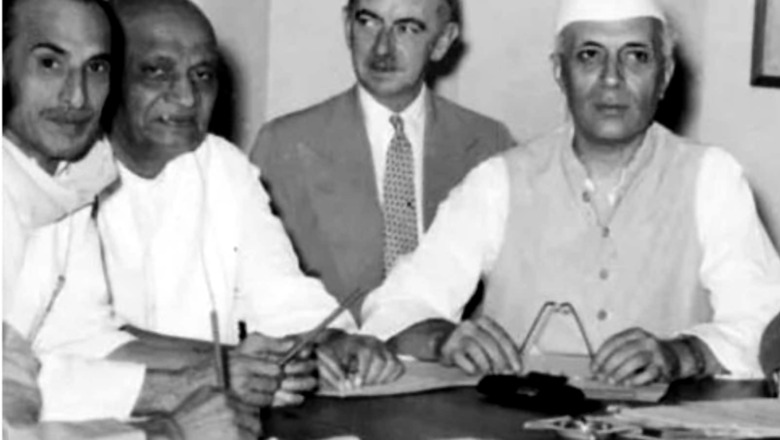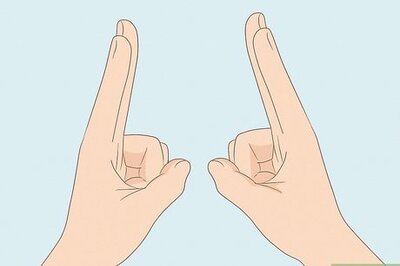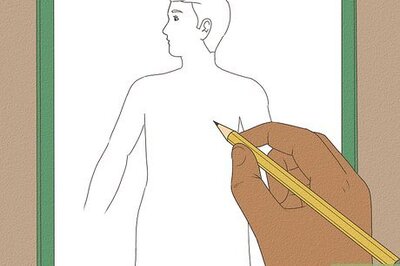
views
Following India’s independence, Jawaharlal Nehru served as the country’s first prime minister for a total of approximately 17 years. He served as prime minister for 6,130 days over several terms, which is the longest premiership in the history of the nation. He passed away on May 27, 1964, at the age of 74.
Today in Classes with News18, we will take you through the tenure of the first PM of India.
Nehru presided over the interim administration in pre-Independence India before becoming the prime minister on August 15, 1947, and leading the nation through its first general elections in 1951–1952.
The election mandate
During the first Lok Sabha elections, 14 national parties participated which includes, the Indian National Congress (INC), All India Bharatiya Jan Sangh (BJS), Bolshevik Party of India, Communist Party of India (CPI), Forward Bloc (Marxist Group), Forward Bloc (Ruikar Group), and Akhil Bharatiya Hindu Mahasabha.
The Congress party, under Nehru, easily won the elections, taking 364 of the 489 seats up for grabs. In actuality, Congress won three out of every four seats in the elections. The House was represented by 11 of the 14 major parties.
The Nehru-led Congress had a clear majority in the first Lok Sabha since there was hardly any opposition. The second-largest group in the House was made up of independents, who had a vote share of 7 per cent and more seats (37), barring the Congress, than any of the remaining 13 national and 39 state parties combined. Only two national parties, the CPI (16 seats) and the Socialist Party (12 seats), could win more than ten seats, aside from the Congress.
In the second general election, Nehru again led the Congress to a landslide victory, with the party bagging 371 of the total 494 Lok Sabha seats. The elections to the third Lok Sabha in 1962 was Nehru’s last national election before his death.
Even though the party’s tally decreased slightly from its result in the previous election, the Congress won 361 of the 494 total seats in the third Lok Sabha elections.
Nehru ran for and won the Allahabad district (east) and Jaunpur district (west) constituency in the first general election. He was elected from the Phulpur seat in the second and third Lok Sabha elections.
When Nehru took charge, India was divided into princely states. Under his administration, his deputy prime minister Vallabhai Patel convinced these princely states to join India as one union. They were successful in regard to most of the Indian states except for former princely states like Jammu & Kashmir, Manipur, and Tripura.
The water distribution treaty between India and Pakistan called Indus Water Treaty was signed under Nehru regime. The Treaty gives control over the waters of the three “eastern rivers” — the Beas, Ravi and Sutlej with a mean annual flow of 33 million acre-feet (MAF) — to India, while control over the waters of the three “western rivers” — the Indus, Chenab and Jhelum with a mean annual flow of 80 MAF — to Pakistan.
Early Life
Early in the 18th century, a family of Kashmiri Brahmans who were renowned for their intellectual prowess and administrative prowess relocated to Delhi, where Nehru was born. He was the son of Motilal Nehru, a well-known attorney, and figurehead in the Indian independence struggle who later rose to prominence as one of Mohandas (Mahatma) Gandhi’s close friends. Two of the four children, including the eldest Jawaharlal, were female. Vijaya Lakshmi Pandit, a sister, later became the first woman to lead the UN General Assembly.
Nehru had his education at home from several English governesses and tutors up until the age of 16. He attended Harrow, a prestigious English school, in 1905, where he spent two years. Nehru’s academic record wasn’t particularly impressive. After leaving Harrow, he spent three years at Trinity College in Cambridge where he earned an honours degree in natural science. He spent two years at the Inner Temple in London after graduating from Cambridge, where he passed his exams “without glory or ignominy,” in his own words.
The autobiography of Nehru reveals his intense interest in Indian politics when he was away at college. His enthusiasm in India’s freedom can be seen in his letters to his father over the same time frame.
To learn about other topics taught in school, explained by News18, here is a list of other Classes With News18: Queries Related to Chapters on Elections | Sex Versus Gender | Cryptocurrencies | Economy & Banks | How to Become President of India | Post Independence Struggle | How Indian Flag Was Adopted | Formation of States & United India | Tipu Sultan | Indian Teachers Day Different from Rest of the World |Queen Elizabeth & Colonialism |Rishi Sunak’s Journey of becoming PM |
Read all the Latest Education News here

















Comments
0 comment